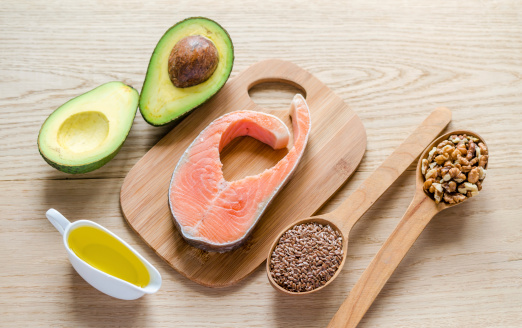Top 7 Foods for a Healthier Heart
Article posted in: Diet & Nutrition
Heart disease is the leading cause of death in the United States. It kills more than 600,000 Americans each year—that’s one in four deaths across the nation. And these aren’t scare tactics—they’re facts from the Centers for Disease Control and Prevention.
Arm yourself with facts—and food—to fight back and win: Include these seven heart-helping items in your diet for a stronger, longer-lasting ticker.
1. Start your day with oatmeal.
There are two kinds of fiber. Insoluble fiber, like the kind in broccoli and the skins of fruits, can’t dissolve in water, and helps keep you regular while staving off hunger pangs. But soluble fiber, the kind found in oatmeal, has even more power: It not only helps control hunger and regulate blood sugar, it grabs cholesterol particles and ushers them out of the body.
As a result, oatmeal lowers your LDL, or “bad,” cholesterol levels. But it does even more for your heart: In 2008, a research review found that not only did this morning must-have lower LDL levels, it also changed the type of LDL particles in the blood. In particular, smaller particles, which pose a greater risk, were more heavily curbed by oatmeal. And the antioxidants in oats can help with inflammation, a risk factor for heart disease. Want the ultimate antioxidant boost? Try this delicious and super simple recipe for Instant Blueberry Crisp.
2. Add some berries.
Speaking of antioxidants, dark berries like blueberries and blackberries pack some of the most antioxidants of any food available. But berries also have been shown to have specific cardiovascular benefits: A 2013 study of 94,000 people found that women between the ages of 25 and 42 who ate three or more servings of strawberries and blueberries each week reduced their risk of heart attack by 32 percent compared to those who had fewer berries.
3. Supplement with olive oil and nuts.
They may not seem related, but here’s why they are: The “Mediterranean Diet” you’ve heard so much about hinges on these two foods. In a 2013 study of 7,447 people in Spain, people with a high risk for cardiovascular disease who ate a Mediterranean diet—with a supplement of nuts and four tablespoons of olive oil per day—reduced their risk of stroke, heart attack and death by 30 percent.
And supplementing can help with weight loss, too: In a German study, dieters given yogurt supplemented with olive oil felt more full throughout the day compared to those supplemented with other fats, and they gained neither weight nor body fat despite eating the yogurt as extra calories.
All nuts can lower cholesterol and decrease inflammation, but walnuts may be the best of all: In 2011, research was presented showing that walnuts have a higher concentration of antioxidants than any other nut, with Brazil nuts coming in second. But as with all nuts, be aware—the calories can add up quick, and putting on extra weight is an additional heart disease risk factor. Measure your portion to get the benefit without the bulk.
4. Snack on an orange.
In a number of studies, Vitamin C intake has been associated with lower levels of cardiovascular disease—but those studies have been correlative, meaning that it could just be that people who eat Vitamin C eat heart-healthier diets in general, not that the Vitamin C itself helped with the heart disease.
But one 2012 study did find a relationship between oranges and disease risk: In the study, published in the journal Stroke, women who consumed high amounts of flavonoids found in grapefruits and oranges had a 19 percent lower risk of clot-based strike than women who didn’t have as much of these compounds.
You could get these flavonoids from orange juice, of course, but the liquid can cause a blood sugar spike and leave you feeling empty—while the fiber in the whole orange can help keep you full, trim, and at even lower risk for heart disease.
5. Have salmon (or another fatty fish) for dinner.
The long-held wisdom that Omega-3 fatty acids are the silver bullet against heart disease has come under some scrutiny: A 2014 study in the Annals of Internal Medicine looked at other studies on the issue, and didn’t find a consistent association between the consumption of these fatty acids and a reduced risk of coronary disease.
But there’s a reason the wisdom became common in the first place: There’s a lot of previous research that shows that Omega-3s lower the risk of irregular heartbeat, decrease triglycerides, and can prevent hardening of the arteries, or atherosclerosis. And a 2014 study in the journal Heart found that Japanese men who consumed a high amount of these fatty acids had a significantly lower incidence of coronary artery calcification than white American men who ate less.
This research could be why the American Heart Association still recommends eating fatty fish at least twice a week. Your best bets for Omega-3s? Salmon, sardines and mackerel.
6. Add dark, leafy greens with tomatoes on the side.
It’s not just kale: Dark green vegetables like spinach are packed with potassium, which helps your heart function correctly, as well as a carotenoid called lutein. In a 2001 study in the journal Circulation, researchers found that people with more lutein in their blood had less thickness in their arteries—that is, the carotenoid lowered their risk of hardening of the arteries, or atherosclerosis. And a 2010 study from the British Medical Journal found that eating more dark, leafy greens can reduce your risk of developing Type 2 diabetes.
Why tomatoes on the side? Like the greens, they’ve got potassium to keep your heart going, but they’ve got another carotenoid called lycopene. Lycopene is associated with keeping blood vessels open, lowering heart attack risk, and, like soluble fiber, with ushering LDL cholesterol out of the body.
7. Sip lots of green tea.
It fights cancer, beats back allergies, reduces inflammation in the body, and, of course, helps with your heart. Green tea is a piping hot little miracle worker: A 2006 study from the Journal of the American Medical Association found that people who drank four or more cups of green tea daily reduced their risk of stroke and cardiovascular disease by 20 percent when compared to those who rarely drink it.
It could be the high concentration of antioxidants: In a 2016 study from Nutrients, scientists concluded that a greater total antioxidant capacity from diet and supplements is related to a blood profile that is “less atherogenic” meaning there is less fatty plaque buildup in the arteries. And green tea is packed with antioxidants, including catechins, which are associated with lower risks of cancer, Alzheimer’s, and, of course, heart disease.
*Always speak to your doctor before making any dietary changes.













